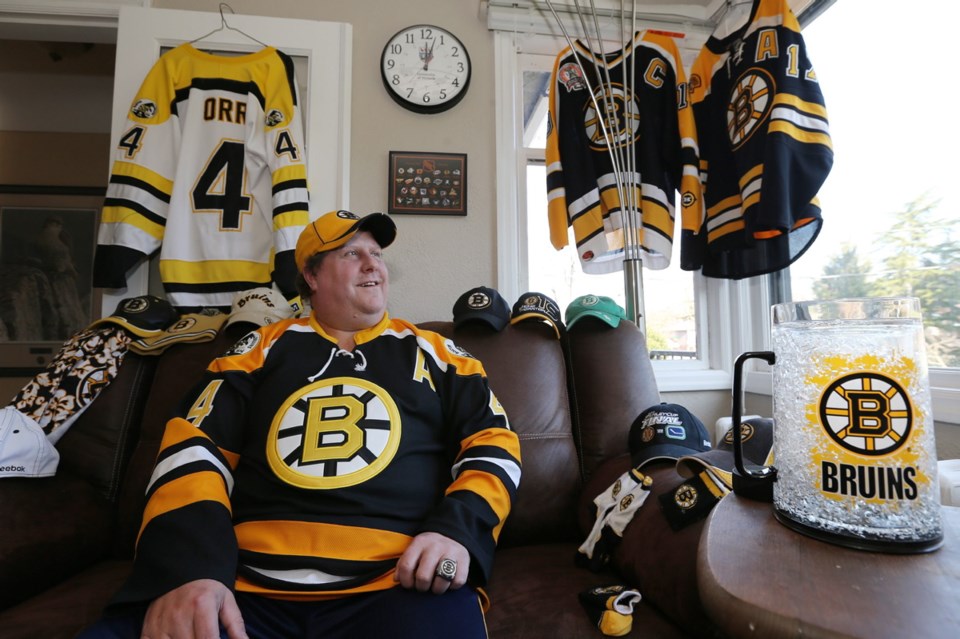When Lane Crockett agrees to sell his autographed hockey sticks on CBC TV’s Four Rooms tonight, the Saanich man is parting with more than memorabilia.
Crockett is passing along proof of what he calls the “healing power of hockey,” and of the big-heartedness of one of hockey’s greatest stars, Bobby Orr.
But it was time, he said, to let the sticks go.
“I had had the sticks for so long and the only people who knew about them were my friends and my family,” the 51-year-old said in an interview last week.
Crockett and his connection to the two sticks — one signed by Orr and the other by the 1970 Stanley Cup-winning Boston Bruins — go back to 1969 when, as a seven-year-old, he was undergoing what was then revolutionary surgery to repair a defective heart valve in Vancouver.
When he woke up after surgery, his dad Neil, a Victoria sales rep, asked him what he would like to help him get better. There were no second thoughts: Crockett wanted a Boston Bruins jersey.
It was a time when there were only two televised NHL games a week: Hockey Night in Canada on Saturdays, and — if you were lucky — NHL on CTV on Wednesdays. The family’s TV set was black and white and no other player stood out for Crockett like No. 4, Bobby Orr.
“There was no remote, you knew the set was going to stay on that channel and I watched this man pick up the puck and just fly,” he said. “And I wanted to be him.”
But the boy’s hospital-bed request nearly stumped his father. The determined dad hunted all over the Lower Mainland and found Canadiens jerseys, Leafs jerseys, but no Bruins.
Finally a colleague, fed up with the father’s obsession, handed him a phone and told him to call the Bruins in Boston and just ask. Somehow, Bruins general manager Milt Schmidt came on the phone and promised to send something.
Weeks later, a package arrived along with letters of support and an autographed photo of Orr addressed to a “great little soldier.”
The following spring, the Bruins won the Stanley Cup, with Orr scoring the winning goal in overtime. The moment of Orr flying through the air, arms extended in celebration, is one of sport’s most memorable photos.
Weeks later, a poster of that picture, signed by Orr, arrived in the Crockett mailbox, along with an invitation to attend Orr’s hockey school in Orillia, Ont. Crockett went, picking up his first stick, the one autographed by Orr.
In October 1970, the Vancouver Canucks entered the NHL. When the Bruins came to Vancouver, Crockett went to the game as a personal guest of Orr, who invited him into the Bruins dressing room.
“I step in and I see Ken Hodge with a stick, and he’s got a rasp and he’s shaving off the Sher-Wood [brand name] writing,” Crockett said.
“Then he hands me the stick and a marker pen and he says, ‘Here, kid. Go get ’em.’ ”
Crockett said what followed was magic for a small boy. He wandered from stall to stall offering the stick to be signed by the players.
“I shook hands with every one of them,” he said. “Phil Esposito filled my pockets with Wrigley’s gum; I got Derek Sanderson coming out of the shower.”
For the next several years, whenever the Bruins came to Vancouver, Orr would set aside a pair of tickets for Crockett.
“It was all just so cool. The memories are just phenomenal.”
Crockett continued to show up at Orr’s hockey school every year and played all the way to major junior. He played for the New Westminster Bruins, whose uniform colours were same as the NHL Bruins.
He recalls suiting up for his first game wearing No. 16, the same number as Sanderson, and pulling on the jersey and seeing the B logo from the inside.
“I thought, ‘OK, I’ve made it. If I never go any further than this, it’s OK,’ ” Crockett said.
He remains a diehard Bruins fan even though the last time he spoke with Orr was around 1970. But his father, now deceased, and Orr continued to fish regularly for years out of Port Alberni.
When Crockett was approached last summer by a CBC producer who had heard of the sticks and asked if he would consider putting them up for sale, he wasn’t interested. But something made him think “everything is for sale.”
During the taping of the show, Crockett heard no offer that was even close to what he thought the sticks were worth.
But the last bid (a figure that will be revealed during the show’s broadcast) was different. Instead of telling Crockett what the sticks would fetch at auction, this bidder said he had no intention of reselling them.
The sticks would be hung at his home, for the sake of a special customer in the audience — the bidder’s young son. That was good enough for Crockett, even though the dollar amount was less than what he had already turned down.
“I wasn’t going to part with them until I heard him say, ‘My son is here and I am going to keep them for him,’ ” he said.
“That’s the sort of person who should have them.”
CBC’s Four Rooms airs tonight at 8.



